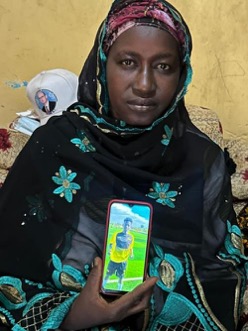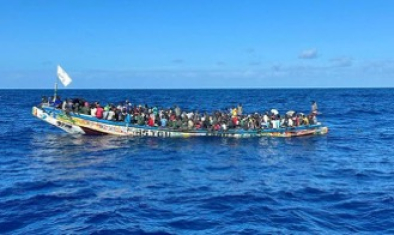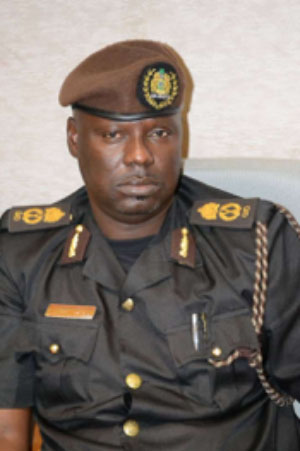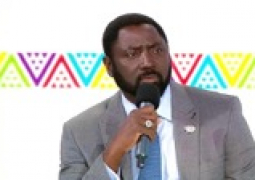
Saho Darboe holding picture of her late son
These devastating incidents that continue to unfold have left many families in tears and worries for their missing sons and daughters who have embarked on the irregular migration, a deadly journey that young Gambians take to migrate for greater income generation. Many blame the government for the unlimited job opportunities and the country’s increasing inflation, as it has risen to 18% in December this year.
According to information received from Ebrima Drammeh, head of the Migrant Situation Movement, from August to November 2023, 17 boats left the shores of The Gambia. He said eight boats arrived at the Canary Islands in Spain with 1,674 people.
He also told this medium that three boats were intercepted in Mauritania with 592 people, and another three boats were also intercepted in Senegal with 612 people. Ebrima Migrant Situation, as he is commonly called, noted that a boat was also intercepted in Mauritania with 66 people.
“We registered 66 deaths excluding the boat that sank more than 100 young people,” he explained.“There is currently a missing boat from the Gambia that departed from Senegal with more than 200 Gambians.”
This medium engaged Mr Ibou Camara, chairperson of Jambur Village Development Committee (VDC) - a community reported to have the highest number of young people who have died on their way to Europe through irregular migration. On 14 October 2023, a boat with over 45 Jambur youths left Kartong for Europe and our source revealed that the boat capsized on 17 October 2023 with over 41 people reported to have died.
Although there is a mixed feeling in Jambur regarding the incident, with some believing their relatives have sunk in the river while others are of the belief that their relatives are alive despite that they have had no communication with them for over two months. Mr Camara told this medium that it’s shocking hearing the deaths of their people. He said there were other people who boarded the boat but were not listed, adding that the death toll rose to over 45 people.
“Young people take irregular routes to migrate because they are demotivated and have no confidence in the economic situation of the country due to lack of employment and source of income generation,” he avers, saying.“Even if you are employed, the wages you get as monthly salary are not rewarding. I know police officers and teachers among those that have taken the journey.”

Local boat carrying irregular migrants / Photo Credit: Gunjur Online
Ebrima Bojang, commonly called Fabou in Brufut, shared a pitiful story with The Point after losing his son Modou Jobe Bojang, aged 27, on the Libyan coast on 13 December 2023. Late Modou Jobe was on the irregular migration journey with Saja Darboe, aged 28, who also lost his life, and Sainey Bojang, who is currently jailed in Libya.
Mr Ebrima Bojang said the boys left the shores of The Gambia on 7 February 2023, and after several months in Libya, the young migrants took a boat at the Libyan coast to continue their journey but were announced dead by their colleague Sainey on 13 December 2023 after their boat capsized on the sea.
“When they left The Gambia, Modou sent a voice message explaining the reasons they embarked on the journey - they couldn’t further resist the hardship we are currently facing,” Ebrima narrates, saying:“Looking at the conditions after completing school without jobs, we can say it is among the frustration that pushes them into the journey.”
Saho Darboe, mother of Modou Jobe Bojang, expressed sad sentiments while emphasizing that her son was a professional footballer who used to travel far to Senegal for the game. She added that losing him through irregular migration was the greatest loss she had experienced. Mrs Darboe said her son left for better job opportunity to help her and her family.
“The reason that motivated him to take the back-way was as a result of unlimited opportunities in the country,” she explained.“He is my first son and I can still remember the words he used to tell me and the passion he had to rescue us from hardship. The reason young people continue to die using the back-way is the suffering we face in the country and I think the government has a role to play.”
Speaking to The Point, Ousman Bojang of Brufut, whose son (Sainey Bojang) is currently jailed in Libya, calls on the government and international partners to help facilitate the release of his son in jail. He adds that “the government should endeavour to create jobs” for young people to boost their earnings for survival.
Lamin Darboe, elder brother to Saja Darboe, told this medium that he was also in Libya and would never recommend anyone to undertake irregular migration due to its risky nature. He explained that they left because of their ambition to struggle harder for their families to survive the hardship in the country.
Mr Darboe added: “We went to Senegal for hustling but it wasn’t a success. We returned to The Gambia to continue the hard work but it became worse and these are the main reasons we embarked on the journey seeking greener pasture to try our luck abroad.”
Kebba Darboe, father to the late Saja Darboe, underscored the important role his son had played in meeting the family's needs and aspirations. He testified that the young people have been working hard to elevate them from their poverty status.
“Their ambition was only to help their families; because, for instance, I have been working as a driver since 1971 but I haven’t got anything to show for it. We continue to suffer due to meager wages in the country. I took care of my parents with my little earnings till they died and the boy was also seeing the same condition happening to me,” Kebba told this medium.

GID commissioner in charge of migration management
Speaking about efforts to mitigate or combat irregular migration, Commissioner Foday Gassama, the commissioner in charge of migration management at GID, told our reporter that this year, his department has registered 29 interception cases among which 10 boats were intercepted with 317 migrants. After the interceptions, he said, his department did investigations and charged about 33 people involving in eight irregular migration cases, saying most of them have been convicted while twopending cases were in court.
Giving a comparison with last year, he said: “We have a total of six cases compared to 29 cases this year. Out of the six, we made three interceptions and the other three were instances we received reports, and our officers would disperse them without arresting anybody. A total of 14 smugglers were charged, and two boats were seized.”
He said the report they received from their partners stated that “out of the 14 boats that arrived in Europe, only two departed from The Gambia”.
On whether probes are made to apprehend perpetrators, Commissioner Gassama explained that this year, they have a total of 55 investigations in different aspects of irregular migration. He said it is a challenge when people travel to Libya by land, arguing that “getting the proof that they are going on irregular migration is always difficult” because of the freedom of movement within the ECOWAS member countries.
On the lack of a legal framework to deal with issues of migrant smugglers, Gassama confessed that The Gambia doesn’t have specific legislation that criminalises the activities of smuggling migrants, unlike other countries. He explained that The Gambia had already signed the United Nations Convention on International Organized Crimes with the Protocol Against Trafficking in Person and Smuggling Migrants.
However, he said: “We have the Trafficking in Person Act 2007 that deals with the issues of trafficking. If a case of trafficking in person is reported, there is a specific criminal law that can be used but there is no specific criminal law for the smuggling of migrants. Some of the time, we charge smugglers with immigration offences, which are administrative and not criminal.”
He emphasised that most of the migrant smugglers are fined (with D5,000) by magistrates due to the lack of a legal framework in place. He revealed that there is a Smuggling of Migrants Bill that was developed, saying the political will is there to ensure that the bill is passed.
“We are hopeful that by 2024, the bill will be tabled before the National Assembly for it to be passed into law. With that law in place, we will be able to deal with the smugglers adequately so that we can combat irregular migrations,” he says.
After several concerns regarding the death toll of Gambians at sea, the Ministry of Foreign Affairs (MOFA), on Wednesday 27 December 2023 held a national dialogue on migration that involved families of victims, governors, permanent secretaries and other stakeholders.
Dr Momodou Tangara, the minister of Foreign Affairs, stated that irregular migration has claimed the lives of many young Gambians leaving families shattered and communities in mourning. It is an underlining reality that calls for a united response, he said, adding that their objective is to bring together stakeholders on migration to openly discuss the challenges and forge a national framework for comprehensive migration intervention, one that doesn’t only end the immediate crisis but caters for the growing demand for youth empowerment.
He continued: “Migration is part of human history and we cannot stop it and that’s why we call on our partners to work with us to map out strategies that would deal with the issue. Our partners have to understand that the solution is not only deportation or security issues; these are developmental and societal issues and they need to create legal pathways for people to travel.”
Abubacar Jeng, National Security Adviser, also reiterated that the subject of migration remains sensitive, political, economic and social. He noted that young people taking the journey to the Sahara desert and the Mediterranean Sea to reach Europe have had serious implications on their communities and the nation.
“The government fully recognizes the link between migration and development, including its potential as a key driver for improving the lives and livelihoods of Gambians and the socio-economic development of our country,” he said, adding: “Almost every country is and to be affected by migration because migration is linked with development, poverty and human rights.”




